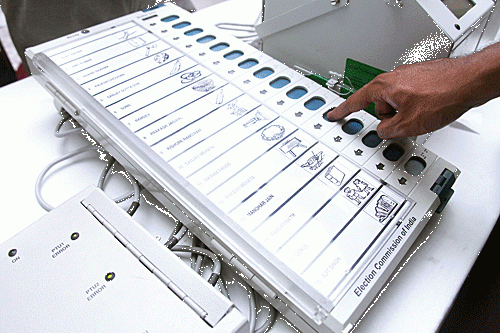Loopholes in the election process, the most fundamental aspect of our democracy, needs to be plugged. Unfortunately, those who can solve the problem seem to have little reason to do so

Electoral reforms have been a topic of discussion forseveral years now. The provocation for this particular piece is the 52nd reportof the parliamentary standing committee on law and justice, in whose jurisdictionthe election commission of India (ECI) falls. The report, presented to theRajya Sabha and laid on the table of the Lok Sabha on May 21, is actually ondemand for grants for 2012-13 but it makes some interesting observations, underthe heading “Model Code of Conduct”.
The first interesting observation is: “The Committeerecommends that the recommendations of the All-Party Committee on ElectoralReforms which submitted its report in May 1990 on the subject matter may betaken into consideration” (Para 3.16). The reference is to what is popularlyknown as the Goswami Committee Report on Electoral Reforms. In the intervening22 years since then, several other eminent groups have applied their minds tothe issue of electoral reforms, some of the prominent ones being the following:The Vohra Committee Report of 1993, the Indrajit Gupta Committee Report onState Funding of Elections of 1998, the Law Commission of India Report onReform of the Electoral Laws in 1999, the Report of the National Commission toreview the Working of the Constitution submitted in 2001, Electoral Reformsproposed by the Election Commission of India in 2004, and the latest, thereport of the Second Administrative Reforms Commission submitted in 2008.
In addition, the law ministry conducted seven regionalconsultations on electoral reforms in 2011, in association with the ECI. But itis baffling that the standing committee should refer only to a report that is22 years old, ignoring everything that has happened since.
The latest episode in this continuing saga is the letterthat the then, and outgoing, chief election commissioner, SY Quraishi, wrote tothe prime minister on April 13, before demitting office on June 10. Someexcerpts from the letter, accessed by filing an RTI application, given belowexemplify the frustration of those trying to improve the electoral system inthe country:
“Hence allow me Sir, to place before you the Commission’sdeep disappointment over the fact that a necessary legislation in this regardis yet to be materialised.”
“However, the quality of our elections often gets questionedon account of certain weaknesses in our electoral process. Commission’s reformproposals have always aimed at addressing this predicament. Though certainminor reforms have been adopted by Government and Parliament, the substantialones have been actually left out allowing the allegations that politicians arenot keen about the reforms because of their vested interest.”
Rightly observing, in Para 3.17, “that Model Code of Conductis a voluntary agreement between the parties for regulating the conduct ofpolitical parties and its members etc. during the process of elections toAssemblies and Parliament,” the standing committee describes its legal statusas “a grey area”.
Then the committee suggests an examination of “the scope ofArticle 324”, before concluding, “Remedial legal steps are required to be takenin this regard.”
Reading between the lines, it appears that this is yetanother attempt at “clipping the wings” of the ECI by the politicalestablishment. The political establishment appears to be extremely defensiveabout the electoral system and refuses to see infirmities.
One of the most important reasons why the MCC has been soeffective over the last 20 years is the swiftness of the actions taken by theECI. Making the MCC part of the Representation of People Act will straightawayremove the capability of the ECI to take swift action. This is astraightforward case of the political establishment using the most drasticParkinson’s Law: Delay is the deadliest form of denial.
Even more insidious is the suggestion for examining “thescope of Article 324”. Article 324, as will be recalled, is the most criticalone for the conduct of elections as it vests the plenary power of“superintendence, direction and control of elections in (the) ElectionCommission”.
Putting the legal straightjacket on the MCC and any changein Article 324 will remove even the semblance of freedom and fairness from theelection process, making it a plaything for political parties which have notcovered themselves with glory in their collective behaviour towards electionsin terms of choice of candidates etc. in the last decade or so.
It is therefore necessary to resist this attempt toemasculate the entire electoral process, and to save the MCC.